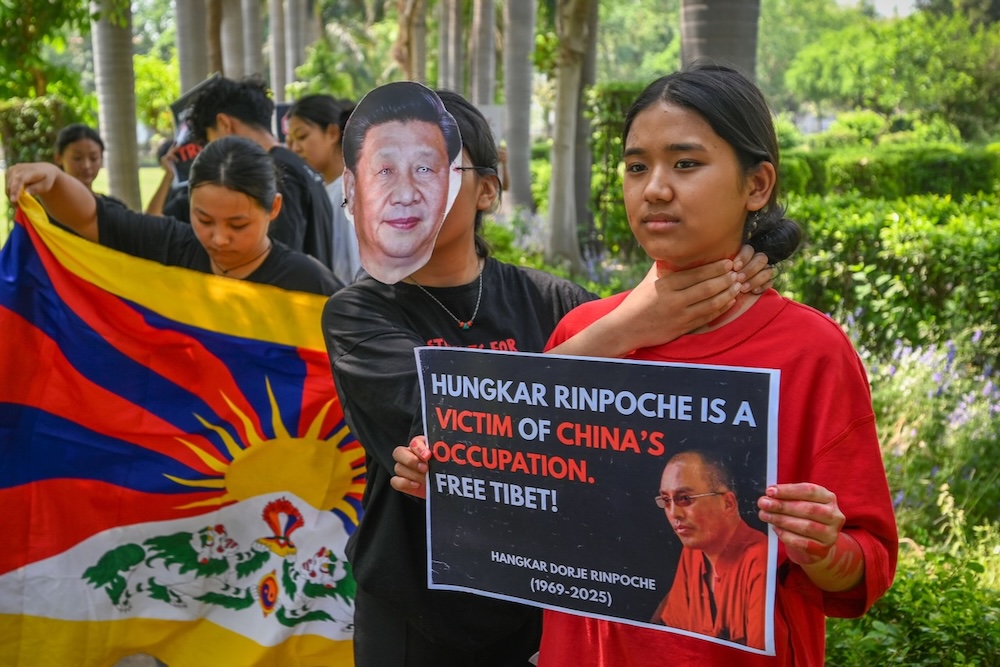Human rights advocates said that the suspicious death of Tibetan writer and educator Humkar Dorje Rinpoche could be a case of transnational repression.
This statement was originally published on pen-international.org on 16 April 2025.
‘The circumstances around the death of Tibetan writer and educator, Humkar Dorje Rinpoche are deeply troubling and raise concerns around the growing threat of transnational repression. We call on the Vietnamese authorities to immediately carry out an independent and transparent investigation into his death and to clarify the role of the Chinese government in his reported arrest’, said Ma Thida, Chair of PEN International’s Writers in Prison Committee.
PEN International, Tibetan Writers Abroad and Vietnamese Abroad PEN Centres express their grave concern over reports of the death of Tibetan writer, educator and religious leader, Humkar Dorje Rinpoche. As Chinese President Xi Jinping visits Vietnam this week, we call on the Vietnamese authorities to urgently carry out an independent investigation into the circumstances of his death, and to facilitate the return of his body to his family.
On 25 March 2025, Humkar Dorje Rinpoche was reportedly arrested by Vietnamese authorities in collaboration with Chinese ‘government agents’ at a hotel in Vietnam’s Ho Chi Minh City. He died in suspicious circumstances while still in custody four days later at age 56.
News of Humkar Dorje Rinpoche’s death in Vietnam emerged after he disappeared several months earlier from Lung-Ngon monastery, located in Qinghai province’s Golok Tibetan Autonomous Prefecture. Humkar Dorje Rinpoche headed the monastery and also oversaw the establishment of several schools and a vocational centre in the territory that provided free education for local Tibetan children.
According to sources, monks at Lung-Ngon monastery were shown by local officials a certificate confirming his death in Vietnam, without providing any information regarding the circumstances that led to his death. The monastery, which is understood to be under tight supervision, subsequently issued a public statement on 3 April claiming that he had been in Vietnam on a religious retreat and that he had died due to illness.
However, this account has been widely viewed as a coerced statement by Tibetan and human rights organisations, with reports subsequently emerging that Humkar Dorje Rinpoche had fled to Vietnam in late 2024 after he was interrogated by the Chinese authorities for not being ‘sufficiently accommodating’ during a visit from the Chinese Communist Party-appointed Panchen Lama, Gyaltsen Norbu, who is not recognised by the Dalai Lama.
Reports of Humkar Dorje Rinpoche’s death in custody have been condemned by the Tibetan exile community, with many noting similarities with other cases, including that of language rights activist Gonpo Namgyal, who died shortly after he had been detained, with his body showing signs of torture. In September 2024, China’s top state security official Chen Wenqing, carried out a four-day inspection visit to Tibet where he called on the territory’s security apparatus to ‘resolutely crack down on separatist and destructive activities’, signalling a further tightening of Tibetan cultural and education policy.
Background
Humkar Dorje Rinpoche was a Tibetan spiritual leader, writer and educator. He was a deeply committed advocate of the Tibetan language and culture and was well-known for his calligraphy skills. He is the author of over 20 texts, including The Melodious Sound of the Laughter of the Vidyadharas of the Three Lineages and Tangkas In Golog: The Tangka Album of Lung-ngon Monastery. Many of his works have been translated into Vietnamese. He had also established a network of government-approved schools that sought to use education as a means to preserve and promote Tibetan culture and language.



